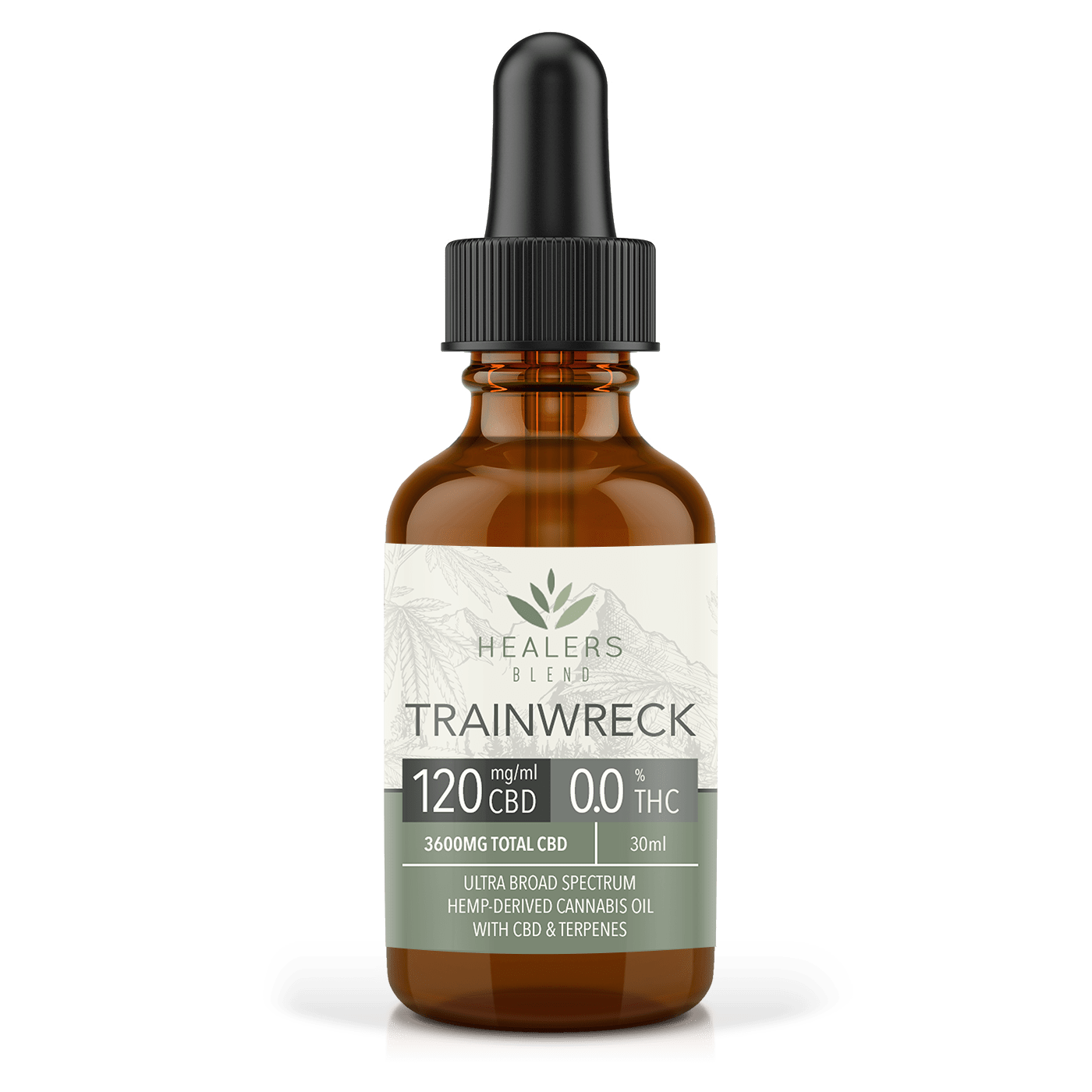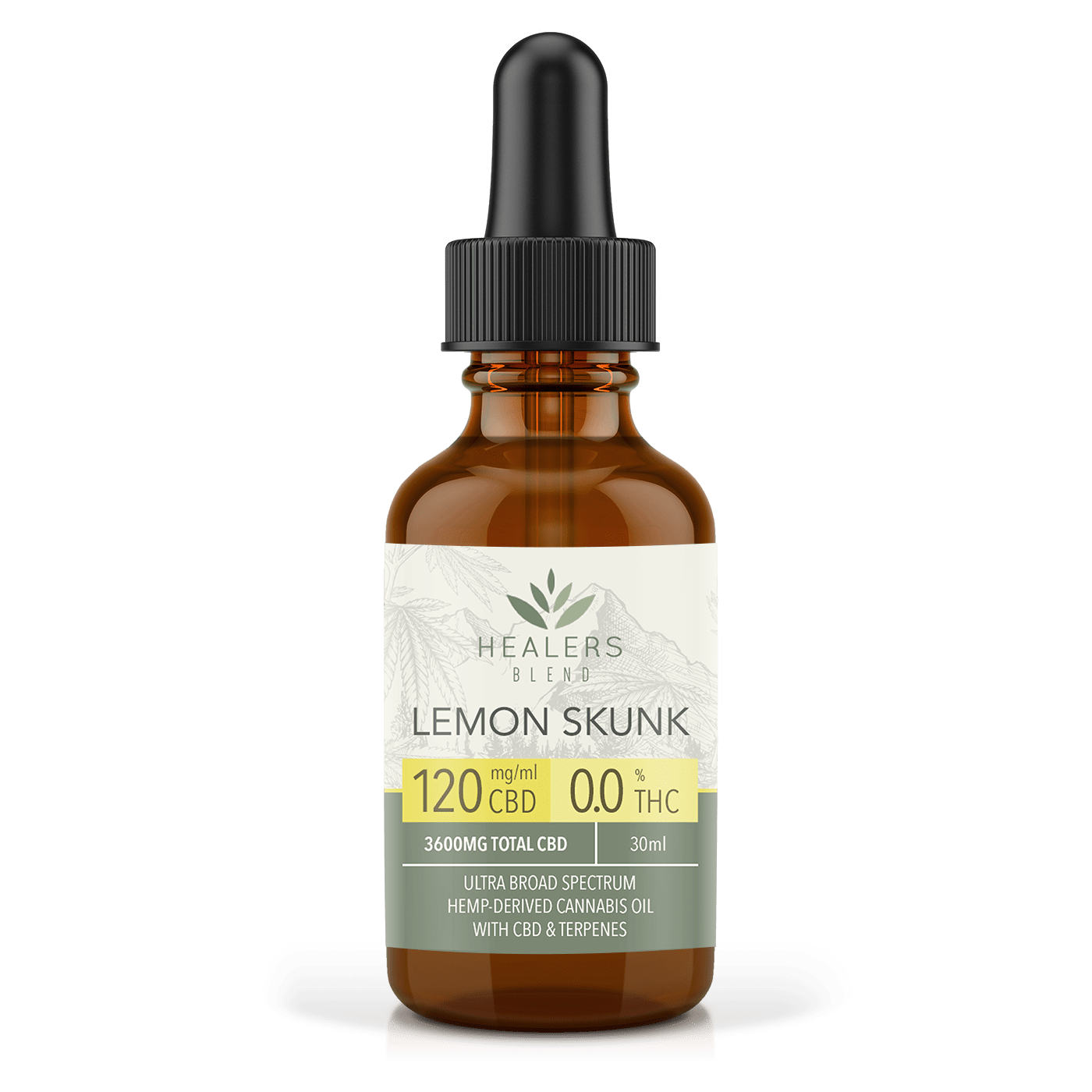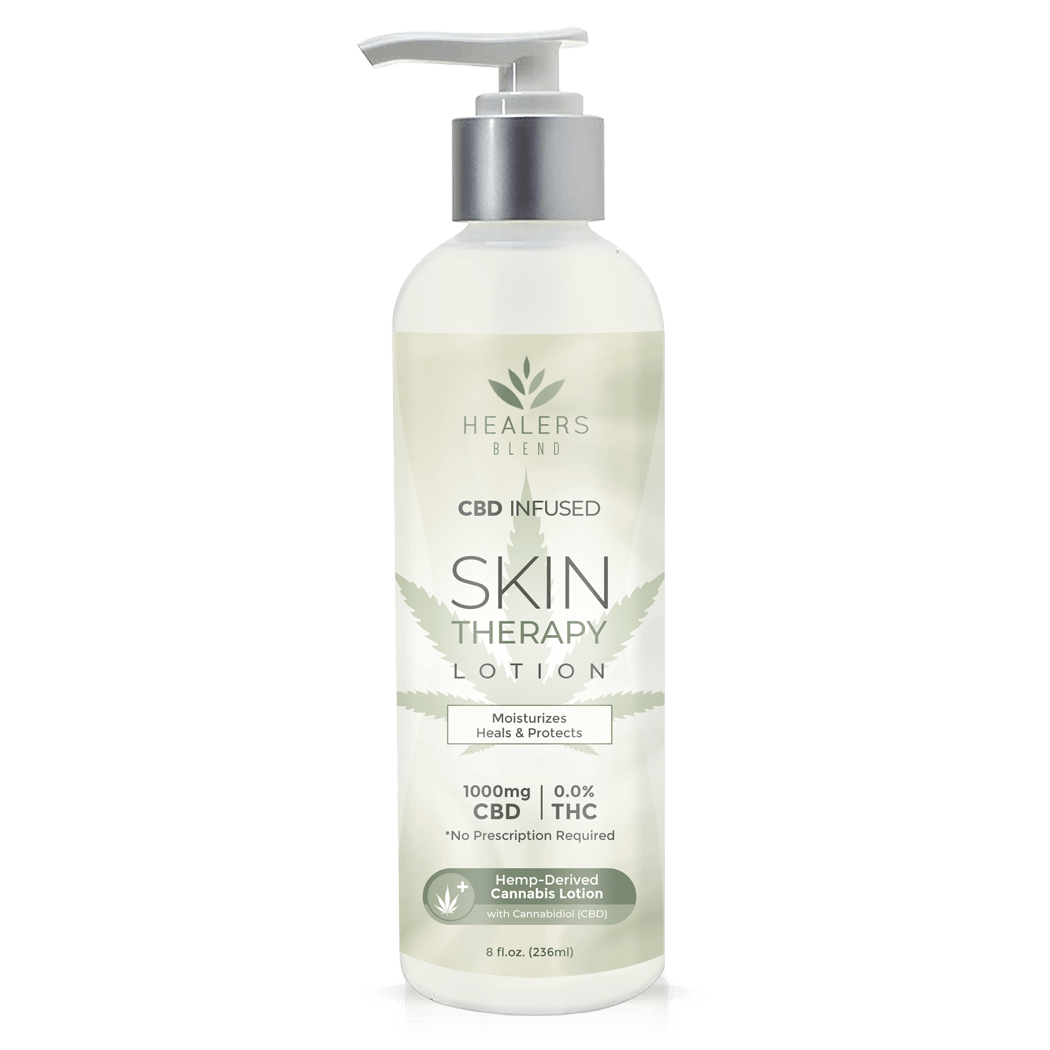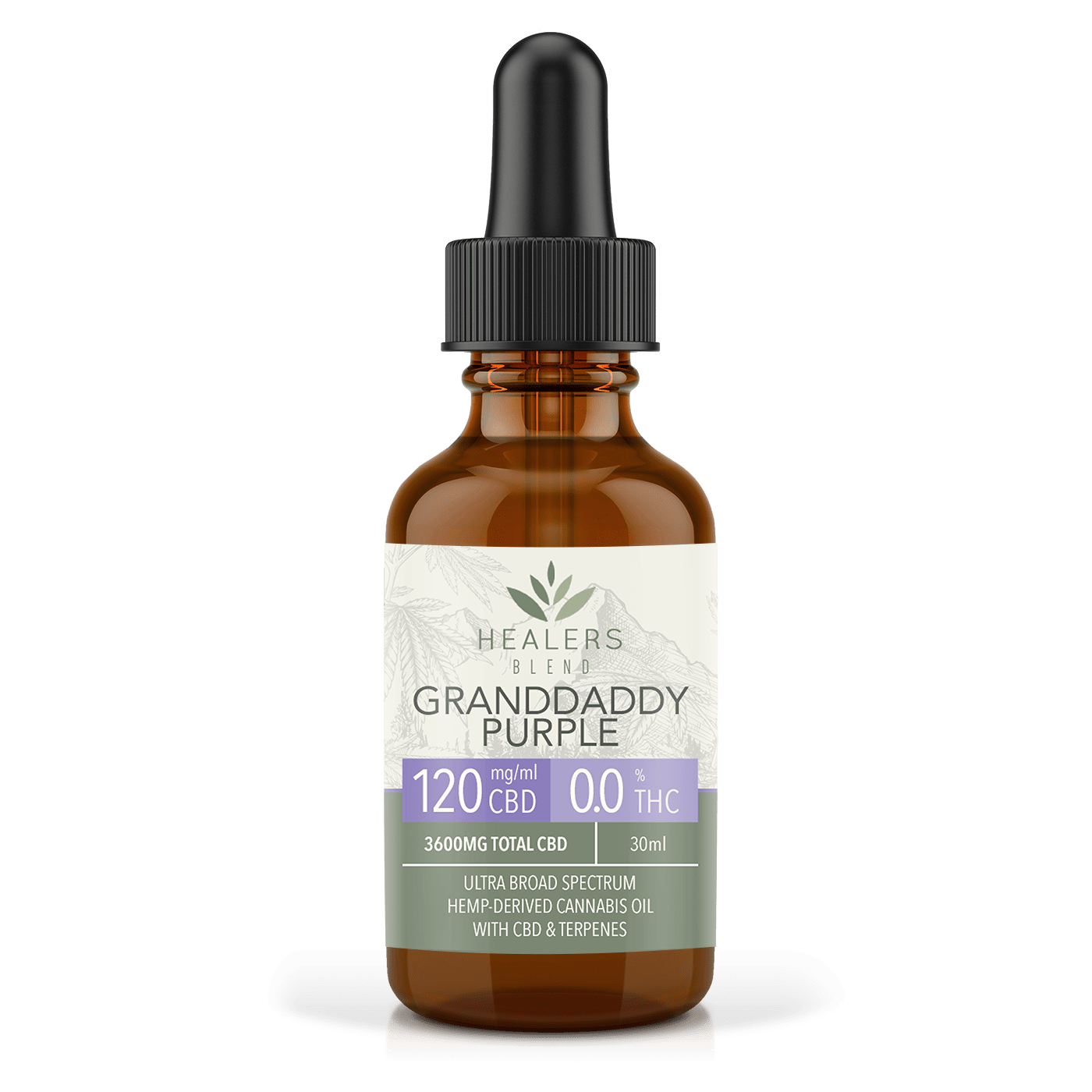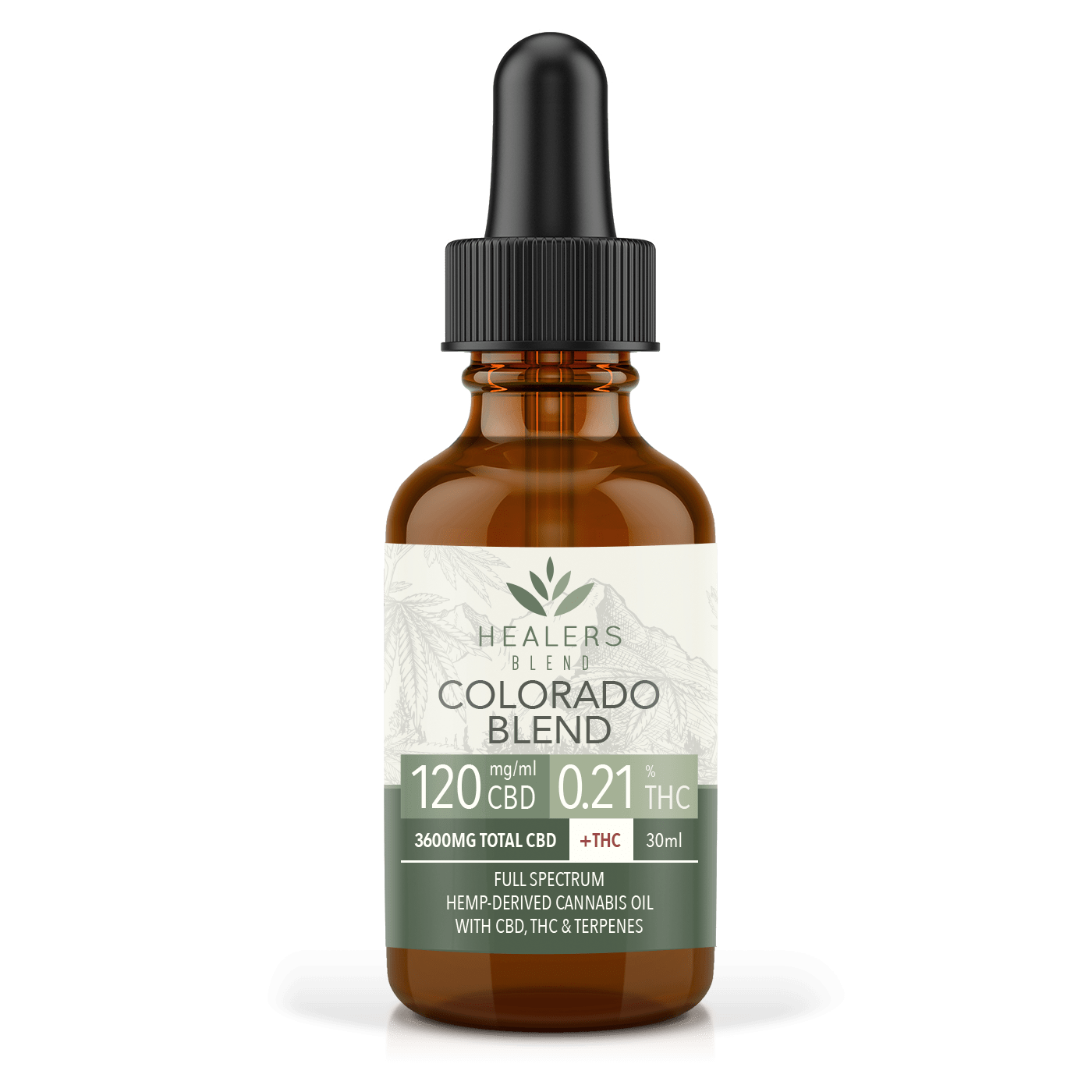The information in these pages are designed for both the general consumer, as well as, health and medical practitioners seeking to expand their working knowledge of cannabis and the potential of cannabinoid based therapies. While we work to ensure the information in these pages and resources is accurate and up to date, we do not make any claims as to the veracity or totality of the information contained herein. Research into cannabis as medicine is ongoing and our understanding of its many potential benefits continues to grow everyday. Our hope is that you will find this information beneficial and inspiring in your own search to better understand the potential of this incredible plant to increase overall health, vitality, and well-being. CBD products are not approved by the FDA for the diagnosis, cure, mitigation, treatment, or prevention of any disease. We are restricted from making any claims about the efficacy of our specific CBD products to treat or cure any disease or medical conditions. You should always seek the advice of a physician before adding nutritional supplements to your diet. The following information is presented for educational purposes only. Healers Blend provides this information to provide an understanding of the potential applications of cannabidiol. Links to third party websites do not constitute an endorsement of these organizations by Healers Blend and none should be inferred.
CBD dosage for anxiety related disorders?
Concerning CBD oil and Anxiety the questions asked regularly are:
How many mg of CBD oil should I take for anxiety?
What is the best CBD oil for anxiety?
How does CBD work to effect anxiety?
What are the side effects of CBD?
In this FAQ, we will answer the above questions, and walk you through the basics of dosing CBD oil products.
- The FDA Guidelines (legal stuff)
- Will CBD Help Anxiety? – The Current Research
- How Many mg of CBD Oil Do I Take? – Finding An Effective Dosage
- How To Determine Dosage Based On Type of Product
- CBD Side Effects and Drug Interactions
1. The FDA Guidelines Concerning The Use and Dosage Of CBD For Anxiety Related Disorders
It is important to note that CBD products are not approved by FDA for the diagnosis, cure, mitigation, treatment, or prevention of any disease. We are restricted from making any claims about the efficacy of our specific CBD products to treat or cure any disease or medical condition including anxiety related disorders.
None of the products or information made available to the public is intended to be a treatment protocol for any disease state, but rather are offered to provide information and choices regarding nutritional support for various health concerns. None of the information presented is intended to be an enticement to purchase and should not be construed as medical advice or instruction. The FDA would want us to remind you: You should always seek the advice of a physician before adding nutritional supplements to your diet.
2. Will CBD Help Anxiety? – The Current Research
Scientific research indicates that CBD may help anxiety in different ways, including through interactions with receptors on nerve cells in the brain’s limbic system. The limbic system is responsible for modulating emotions, anxiety and the human stress response (fight or flight). CBD has been shown to interact with adenosine, serotonin and GABA receptors, among others. These receptors have been implicated in anxiety in both animal and human studies.1-3 (https://www.ncbi.nlm.nih.gov/pmc/articles/PMC4303399/, https://www.ncbi.nlm.nih.gov/pubmed/19423077, https://www.ncbi.nlm.nih.gov/pubmed/18508500).
The evidence base is building for CBD as an effective anxiolytic (i.e. anxiety reducing agent), with some promising findings in both animal and human studies. In a research review published in 2017, Brazilian researchers concluded that, “Studies using animal models of anxiety…clearly suggest an anxiolytic-like effect of CBD.” (REFERENCE) Human studies have also found benefit. Surveys of CBD users, for example, have found anxiety to be one of the most common reasons people use CBD.4 (https://www.ncbi.nlm.nih.gov/pubmed/30014038) Clinical trials have also shown benefit. For example, in a 2011 clinical trial of individuals with Social Anxiety Disorder (SAD) pre-treatment with CBD was found to reduce self-reported and measurable indicators of anxiety provoked by a simulated public speaking test. In another 2011 clinical trial, also conducted among individuals with SAD, CBD decreased subjectively reported anxiety. Functional neuroimaging demonstrated that the reduction in anxiety was associated with changes in activity in limbic and paralimbic brain areas – regions of the brain thought to be associated with emotions, specifically anxiety.5 (https://www.ncbi.nlm.nih.gov/pubmed/20829306) CBD has also been shown to reduce the anxiety provoking effects of THC, when administered concurrently.6 (https://www.ncbi.nlm.nih.gov/pubmed/6285406)
For your convenience, and to assist with your research, we have assembled an index of published studies on CBD as a treatment for anxiety.
3. How Many mg Of CBD Oil Do I Take? – Finding Your Effective Dosage:
Due to FDA regulations we cannot give specific advice on how to use CBD for a particular condition such as general anxiety or other anxiety related disorders. Fortunately though, the process to find a minimum effective dose of CBD for any condition, is very simple. The key to finding the most effective dosage is by using what is called, a Stepwise Dosing procedure.
Stepwise Dosing is a process by which you first establish a baseline dosage, then adjust the dosage incrementally over a set period of time (typically 3 days) until you find your effective dose.
It is important to recognize that everyone responds a little differently to CBD so there is no set dose for everyone or every condition. By following a stepwise dosing procedure you can find the most effective dosage of CBD for you.
The Stepwise Dosing Procedure
Start Low and Go Slow: The first step to finding your minimum effective dose is to establish a baseline dosage. Since many people report good results with CBD at low doses, we suggest you start with a minimal dose and slowly increase the dosage until you find results. Start with a small baseline dosage between 2-5mg, 2X or 3x daily (6-10mg total).
- Maintain your baseline dosage for 7 days taking note of how the CBD interacts with your body.
- After the initial 7 days of your baseline CBD dosage, if you are not receiving the benefit you need, then increase the daily dosage by 1-2mg every 3 days until you find the dosage that works best for you.
- Once you have determined your minimum effective dose you may wish to decrease your dosage by one step to see if you can maintain the benefits at a slightly lower dosage.
Important Note: Typically, people decide to try CBD because of a specific condition, only to find it helps other areas of their body as well. Remember, your endocannabinoid system runs throughout the entire body at a cellular and sub-cellular level. CBD is a whole-body compound. When you start taking CBD for the first time, pay attention to everything going on in your body. Do not be surprised if you find various benefits from your dosage.
About Sleep: Often times, certain conditions or side-effects from medication can create insomnia. Sleep is essential to the bodies healing and recovery process. If sleep deprivation is an issue, you may want to consider weighting your dosage heavier at night to assist with a more sound sleep.
Establishing a baseline CBD dosage in mg by weight
If you feel you need a higher dosage as a starting point we have created the following chart to assist you. This chart is submitted as a suggestive guide only and is not meant to take the place of a qualified physician.
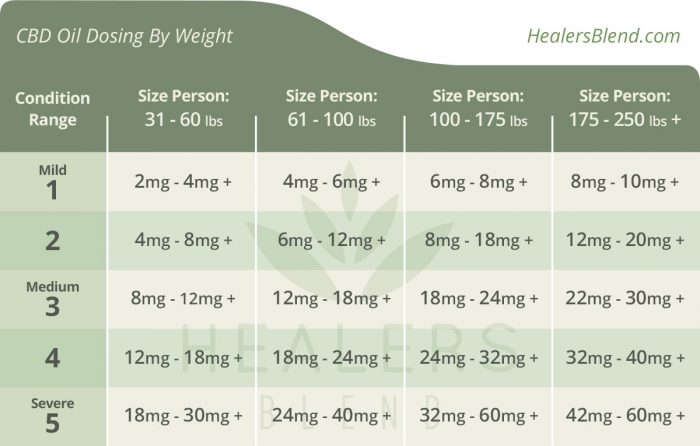
4. How To Determine CBD Dosage Based On A Specific Product
Dosing With Sublingual CBD Oils
Once you have established a minimum effective dose using the stepwise dosing procedure, the following chart will help you determine which sublingual oil potency will best meet your daily dosage requirement. To find the best product match for your dosage simply match your daily dosage to the row on the chart labeled “30 Day Supply in Bottle”. For example: If you need 15mg CBD daily then according to the chart you would need a 450mg product. The chart also acts as a guide to how to use the glass dropper to measure out CBD in milligrams.
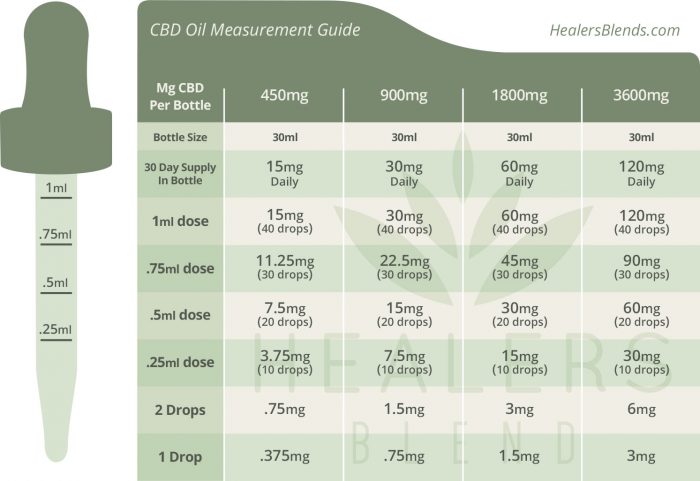
5. Possible Side Effects Of CBD And Drug Interaction
There are multiple studies demonstrating the effectiveness of CBD in treating various conditions. Most of these studies conclude that CBD (cannabidiol) is safe and virtually free of side effects.
A review on the Safety and side effects of cannabidiol by the NCBI for example suggests that controlled CBD (cannabidiol) administration is safe and non-toxic in humans and animals. It also does not induce changes in food intake; nor does it affect physiological parameters like heart rate, body temperature or blood pressure. Also, according to this review paper, “high doses up to 1,500 mg/day of CBD are reportedly well tolerated in humans.”
There are very few known side effects of CBD, these are mostly minor but you should be informed before taking CBD:
- Inhibition of hepatic drug metabolism – CBD and other plant cannabinoids can potentially interact with some pharmaceuticals by inhibiting the activity of cytochrome P450, a family of liver enzymes. This key enzyme group is responsible for metabolizing some of the drugs we consume. At sufficient dosages, CBD will temporarily deactivate cytochrome P450 enzymes, thereby altering how we metabolize certain compounds. A 2013 report on a clinical trial using GW Pharmaceutical’s Sativex, found no interactions with CYP enzymes when approximately 40mg of CBD were administered.
GRAPEFRUIT WARNING: If your medication has a grapefruit consumption warning label then you should not take CBD without first talking to your doctor or pharmacist to see if CBD will inhibit the efficacy of your medication. - Dry mouth- Some people have reported an unpleasant dry sensation in the mouth.
- Increased tremor with Parkinson’s at high CBD dosages – There are studies showing the potential of CBD to help alleviate symptoms of Parkinson’s disease. However, there have been reports of CBD increasing tremors when taken at very high dosages. Reducing intake to a smaller dosage will typically eliminate increased tremors.
- Lightheadedness – In cases where extremely high dosages of CBD are being taken some people have reported temporary lightheadedness.
- Drowsiness – Higher dosages of CBD may cause of drowsiness. If you are affected this way, you should not operate machinery or drive a vehicle. Conversely, due to its bi-phasic nature, micro-doses of CBD act as a wake-inducing agent.
Special Precautions & Warnings:
Pregnancy and breast-feeding: There is not enough reliable information about the safety of taking CBD if you are pregnant or breast feeding. Stay on the safe side and avoid use.
References
1. Nuss P. Anxiety disorders and GABA neurotransmission: a disturbance of modulation. Neuropsychiatr Dis Treat. 2015;11:165-175.
2. Akimova E, Lanzenberger R, Kasper S. The serotonin-1A receptor in anxiety disorders. Biol Psychiatry. 2009;66(7):627-635.
3. Correa M, Font L. Is there a major role for adenosine A2A receptors in anxiety? Front Biosci. 2008;13:4058-4070.
4. Corroon JM, Phillips J. A Cross-Sectional Study of Cannabidiol Users. Cannabis and cannabinoid research. 2018.
5. Crippa JA, Derenusson GN, Ferrari TB, et al. Neural basis of anxiolytic effects of cannabidiol (CBD) in generalized social anxiety disorder: a preliminary report. Journal of psychopharmacology (Oxford, England). 2011;25(1):121-130.
6. Zuardi AW, Shirakawa I, Finkelfarb E, Karniol IG. Action of cannabidiol on the anxiety and other effects produced by delta 9-THC in normal subjects. Psychopharmacology. 1982;76(3):245-250.
Our Favorite CBD oil Strains For Creating Calm, Balance and Focus
Known for creating balance, and instilling an overall sense of well-being, many people trust CBD to help manage emotions and focus. Grandaddy Purple is especially popular for this effect. Unlike marijuana strains, this CBD oil strain contains 0.0% THC and will not make you high. To explore the many benefits of this popular strain, explore the tab labeled “Terpenes and Effects” found on each product page.
Have you considered CBD (cannabidiol) with trace THC?
Our Colorado Harvest oils are also an excellent choice for those who want a trace amount of THC in their oil. The Colorado Harvest oil meets the federal standard of <.3% THC (less than .3% THC), is federally legal, and can be sold without the need for a prescription. This trace amount of THC will not cause intoxication and is legal to purchase without prescription or card.
-
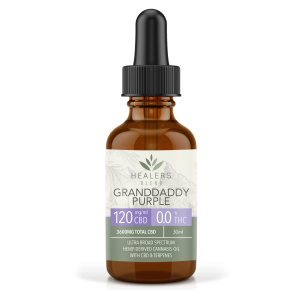 GRANDDADDY PURPLE Strain – 30mlPrice range: $55.95 through $185.95
GRANDDADDY PURPLE Strain – 30mlPrice range: $55.95 through $185.95 -
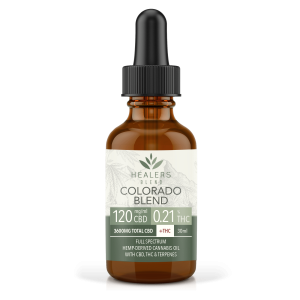 Colorado Blend – 30mlPrice range: $59.00 through $189.00
Colorado Blend – 30mlPrice range: $59.00 through $189.00


